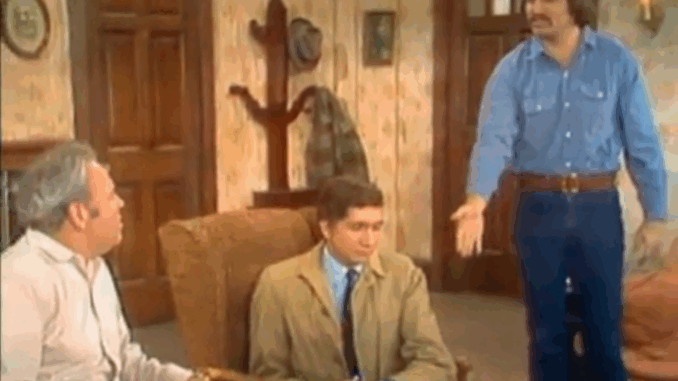
When All in the Family aired the episode “Archie and the F.B.I.” on January 15, 1972, it delivered more than just laughs—it captured the paranoia, division, and distrust of an America grappling with the Cold War, McCarthy-era hangovers, and civil unrest. In just under 30 minutes, the show dissected the fragile psyche of the so-called “silent majority” and turned it into timeless comedy.
This episode remains one of All in the Family’s sharpest political commentaries—and one of Archie Bunker’s most revealing moments.
The Plot: Archie vs. The Government
The episode opens with a seemingly simple premise: Archie Bunker receives a letter from the F.B.I. Not because he’s under investigation, but because they’re conducting a routine background check on a former co-worker applying for a government job.
Simple enough, right?
Not for Archie.
In a matter of minutes, his mind spirals into full-blown panic. He’s convinced he’s being watched, suspected, and maybe even set up. Why would the F.B.I. be interested in him, he wonders, unless they thought he was hiding something? As usual, his assumptions come loaded with paranoia, half-baked theories, and a complete misunderstanding of how the world actually works.
The Bigger Message: Fear and Distrust in the American Mind
What makes “Archie and the F.B.I.” brilliant isn’t just the comedy—it’s the context. The episode aired at a time when Watergate, COINTELPRO, and memories of McCarthyism were either unfolding or fresh in public memory. Americans were increasingly skeptical of their government. But in Archie Bunker’s world, suspicion wasn’t about systemic critique—it was personal, chaotic, and often misdirected.
Archie, a proud patriot, suddenly finds himself scared of the very government he claims to trust. It’s a brilliant contradiction: the man who rails against “commies” and protestors suddenly starts shredding documents and second-guessing everything he’s ever said.
Comedy as Social Mirror
The episode is classic Norman Lear—unafraid to use humor as a scalpel, cutting deep into the psyche of working-class conservatism. Carroll O’Connor’s performance is, as always, masterful. His Archie is not evil, but misinformed, fearful, and proudly stubborn. Watching him panic is hilarious—but it’s also uncomfortably real.
Meanwhile, Mike “Meathead” Stivic (Rob Reiner) provides the perfect foil, mocking Archie’s paranoia while offering viewers a more rational perspective. Their exchanges are more than jokes—they’re cultural crossfire, representing a generational divide that still resonates today.
Why It Still Resonates
In a post-9/11, post-Snowden, digitally-surveilled world, “Archie and the F.B.I.” hits different. The fear of being watched, misunderstood, or wrongly accused is more relevant than ever. But the episode reminds us that often, the greatest threat isn’t the system—it’s our inability to understand it.
Archie’s panic doesn’t stem from any real wrongdoing—it stems from not knowing what’s real and what’s rumor. And in that, All in the Family once again proves its brilliance: it doesn’t just reflect the times, it anticipates them.
Final Thoughts
“Archie and the F.B.I.” is a comedic time capsule that doubles as a social warning. With its sharp writing, pitch-perfect performances, and fearless satire, it remains one of the most iconic examples of how sitcoms can do more than entertain—they can provoke, reflect, and challenge the audience to think.